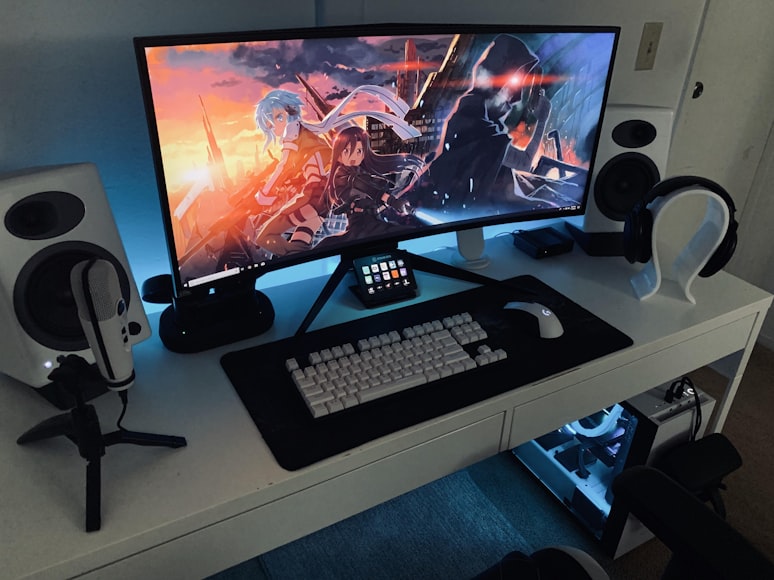Most professional gamers prefer to play their favorite games on desktop PCs, which cannot be readily relocated. anywhere they want. Moreover, playing doesn’t usually happen in a matter of minutes rather it takes hours spent in the same position. Because of that, many people ask themselves if there’s a way to increase comfort and decrease health damage, caused by constant sitting. The answer to the problem could be a dedicated gaming desk.
Contents
You can’t Buy your Health but You can Buy a Gaming Desk
Many people consider buying a gaming desk an unnecessary addition or an expense that does not give them any benefits. They could not be more wrong as the benefits of a properly adjusted desk are massive.
Of course, any desk can (and should) be adjusted to the person that’s going to use it, but gaming desks are usually designed to give players the option to set them in the exact way they may need it.
This means that, while a conventional table may be used to place a PC on, gaming desks offer a few significant benefits that can assist lessen the harm caused by extended durations of sitting in one posture in front of a screen.
Spending long hours playing can lead to some of the typical gaming injuries, which include pulled muscles, eyesores, or tennis elbow.
All these ailments can be easily prevented using desks that are properly adjusted to your posture and height – and a good desk costs much less than good treatment.
The Comfort of Your Time Spent Playing
Modern gaming workstations are generally quite ergonomic in design, allowing you to adjust the height, angle, and depth of your monitor stand, the desk’s height, or even the length of the surface.
Some even transform into a standing desk, allowing you to switch between sitting and standing positions.
Standing may be healthier than sitting, according to some research, since it helps your blood to circulate more freely, which may improve your reflexes.
Unlike typical desks, gaming desks offer a high level of customizability, usually allowing you to stay comfortable regardless of your height or favorite sitting position.
Manufacturers of such desks don’t forget about your legs, giving you enough space so that you don’t kick the bottom of the desk surface while playing intensively.
Manage Your Space Properly

Gaming requires a high level of focus. Lack of order around you can easily decrease it and distract you when you should be laser-focused on your game. That’s why good gaming desks usually come with management systems for PC power cords or even USB hubs. This allows you to easily manage all the cables as well as any devices that require a USB connection.
A well-designed gaming desk usually gives you much more space in terms of moving your mouse. How many times were you frustrated, bumping into stuff during very quick action in your favorite game? The ideal space for a mouse pad is at least about a foot. Of course, you don’t play with your mouse only, and gaming keyboards are usually bigger than typical office ones, requiring a bit bigger than the usual keyboard tray. With a mouse, that adds up to almost two and a half feet of desktop area for comfortable keyboard and mouse operation.
Upgrading your PC made easy
A typical table or desk that some people tend to keep their computers on is usually very static, and cannot easily be moved either since it could collapse under the weight of the screen, PC, and everything else that you keep on it or simply because it wasn’t designed to give you any mobility. A good gaming desk should have the option to be easily moved or relocated. That’s why, many gaming desks come with casters that make the cleaning, maintenance, or PC upgrades much more convenient.
It’s not a matter of whether you should get one.
The benefits of a properly chosen gaming desk are so big, that playing without one is simply damaging your health. Plus, as gaming desks are usually much more comfortable, they simply make the process of playing a game much more enjoyable, increasing the joy that comes with spending time playing.
Related Articles:
Best Motorcycle Riding Gloves | Ultimate Guide




